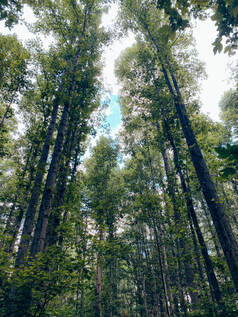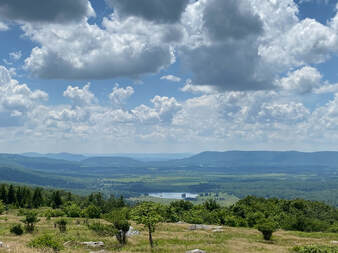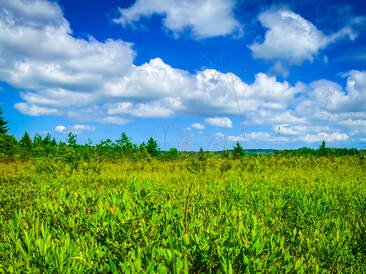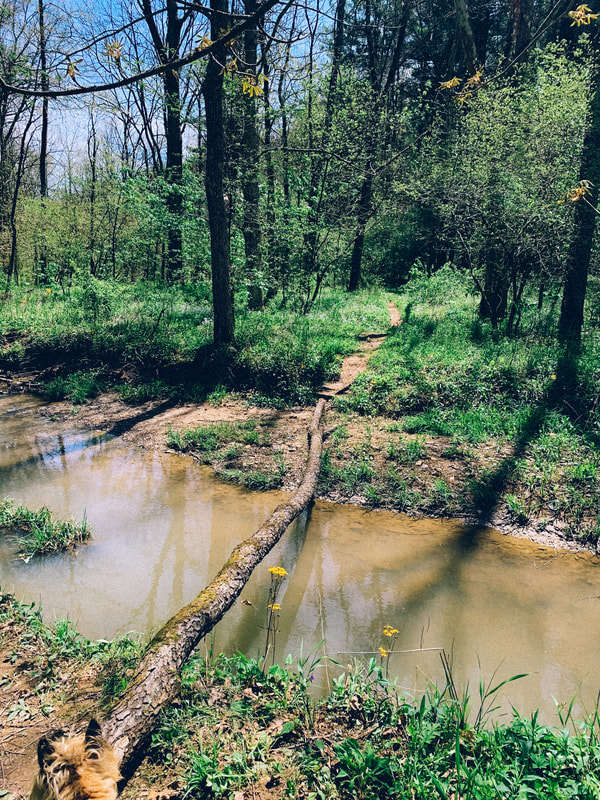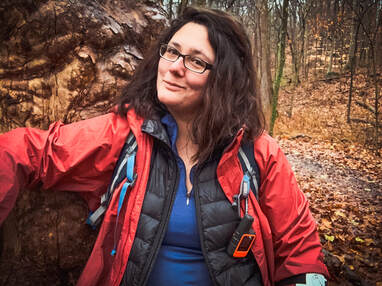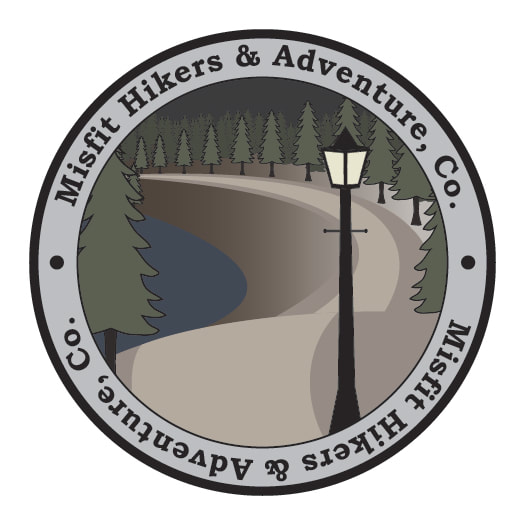|
I've been processing my last solo trip for a little while, which was to Wildcat Hollow in Southeast Ohio. I love Wildcat. It's challenging with elevation, lots of spots to stop, pretty, has bug out points, and is perfect length for a weekend. That's why I love solo-ing there.....correction....LOVED solo-ing there.
. The last time I stayed there I was down in the spooky-ass valley. I got there as dusk was falling, the camp I wanted to stay in was taken. So I'm in the mostly overgrown, super creepy camp spot. The ONLY spot I get icky vibes off of. Of course. And it was cloudy. SO ZERO LIGHT. . Whatever, I'm badass and awesome, so I just trundled off to bed with Lucy, my mostly fearless companion....and a book on tape to drown out my own imagination. . Let me say I felt pretty comfortable. I wasn't *super* creeped out, just my own imagination running wild. I fell asleep, feeling good. And then was awoken at 1:30ish to light beaming in my tent. WTAF. WTAF. WTAF. Bear spray in hand, I peered out. First thought was aliens. Second thought backpackers coming in late after work. But I could see them on the trail, about 40 feet away, flashlights in hand and stumbling along, no packs visible. Roads intersect Wildcat and they seemed drunk or high, so I guessed they were out there to party. My campsite was overgrown, and it was very foggy, so I figured they didn't see me (Lucy just crouched low to the ground and stared, not barking for once lol). I waited about fifteen minutes, prayed I wouldn't have to pee, and then snuggled back to bed with Lucy. Quite proud of myself, I'd like to mention. . Then the FUCKING GUNSHOTS STARTED. Two in the morning, and close. Like, it could be the guys kinda close. And not one or two, like 20 or more. I noped the fuck out after that. Lucy was losing her shit, terrified. I was afraid but not terrified, but I wasn't sticking around. I jammed everything in my pack, called my dad to come meet me at a random road, and hiked four and a half miles out. . There were a lot of things that ran through my head - one dude just murdered another and I was going to see a body that night (drug deal gone bad? illegal dumping? all of those things are present down there). Or, more likely, two drunk dudes illegally poaching deer. Didn't wanna run in to them doing that, either. I grew up 20 minutes from there. Not folks you want to run in to. . It was legit scary. But I'll tell ya what - I didn't panic. I assessed the situation, deemed it no longer safe to remain, and got myself out of the situation. And I don't feel bad for bugging out. I go in to every solo (and regular bp trip to be honest) with a solid foundation of what to do if shit hits the fan - what are the ways out of the woods? Who do I call? Do I have a means to get help if I can't get out? Do I have a means to survive the most obvious situations until help arrives? . These are all questions you should ask yourself - and have answers to - every time you go out in the woods, whether to hike or backpack, alone or with others. . In the weeks following my bug out, quite a few folks in my hiking groups have mentioned staying at Wildcat and the significant amount of gunfire they heard while there. Not just me. It's frustrating, but also good to know. . I WILL be solo'ing again, and I'll post some of my theories at another time. . What's the worst thing that's happened to you at night while backpacking? Solo or with others? How did you overcome it?
1 Comment
Who wants to miss out on views and experiences like this, all because they can't find someone to go with them? There's already enough obstacles so many face in getting out to enjoy the outdoors, why should our fear of being alone and what could happen be one of them? Last post I wrote about the fear of being out there, and that the chance of being attacked (by a person) on the trail was actually extraordinarily low. But when you're out alone, there ARE some precautions you can take to help keep yourself safe - against people, loose dogs, injuring yourself, etc. (note: always read up on the wildlife on the area and prepare accordingly). So read on for some of my own tips and tricks, as well as some from my readers as well!
DO: - Step off the trail when possible to let folks pass, so you have full view of them. - GPS/Life Link through All Trails - I have a Garmin InReach, which has an SOS button which summons search and rescue, and I can text my family (with coordinates) when I don't have cell service. This is GREAT if you hike alone, where the danger of twisting an ankle or falling means you could need some help. - A lot of people said get a dog - this is an inbetween for me. Dogs can be a great protector, but they can also cause problems if in a dangerous situation (I'll do a separate post about this). I have a dog. I'd rather take my chances than leave my boo home. - Mace/Pepper Spray/Bear Spray - I carry bear spray now at all times, because loose dogs. It's in a holster on my belt. If you carry mace or something similar, then keep it handy - around your neck, wrist, etc. NOT in a pocket, and PRACTICE pulling it out! - Use hiking poles - not only will they save loads of strain on your back and knees, but handy to beat away dogs. They also keep you from slipping and injuring yourself. - Trust your gut - if you feel uncomfortable, get out of there - Take a self defense class - Carry a weapon - if you're going to carry a weapon - from bull whip to knife to gun to stun gun - you need to be experienced in its use. A few hours at the range doesn't count. I mean, I saw a dude running on rocks with an ax at Dolly Sods. Don't do that, my guy. In fact, because it gives you a false sense of security, you may ignore other safety measures that have significantly more impact. - Snap a pic - sometimes I'll be in a parking lot and there will be someone waiting in a car, which is normal but always weirds me out, so I casually snap a pic of them/license plate and send to husband. - Tell someone where you are going and when you should be back. EVERY TIME. - Find a way to quiet your mind - Look, a lot of the fear you feel out there about being alone and what can happen is just that...fear. It's gonna hamper you, and the anxiety can be intense. Find a way to distract yourself - I listen to books on tape (no earpods or just one!!). There's music, talking to yourself, reciting a poem over and over (mine is "he thrusts his fists against the post and still insists he sees the ghost). DON'T: - Don't wear earbuds - or only one earbud - you need to be aware of your surroundings. - Don't be afraid to move on from a conversation - you don't owe anyone anything on the trail. If you aren't comfortable showing a solo-guy on a map where you are, then don't. - Don't randomly meet up with someone from the internet, because you think hiking with a stranger is safer than hiking alone. Even if a woman, be careful, do your research and meet up ahead of time to check them out. JUST BECAUSE THEY ARE FEMALE DOES NOT AUTOMATICALLY MEAN THEY ARE A SAFE STRANGER. - Don't park next to cars in the parking lot if you can avoid it. And ALWAYS be aware of your surroundings in the parking lot. Don't be distracted here. The chance of being injured by someone on the trail is extraordinarily low. SO LOW. When I say low, I mean LOW. I had trouble finding any cases at all - really only a handful. Folks are more likely to run in to someone in the parking lot (STILL very very low). Folks are definitely more likely to encounter a loose dog or trip and fall. Be prepared for those situations. In the end, the more you do it, the more comfortable you'll be. It's natural to feel scared and unsure in the woods - we're taught that being alone is a bad thing and from the time we're kids that the woods hold monsters. Coupled together and WHAM! But while you should be careful and respect your surroundings, you shouldn't let it stop you from getting out there. If I - who has an imagination that goes WILD - can hike in the dark and even do solo trips - can do it, then YOU. CAN. TOO. Any other tips and tricks of the trade? I know there's more! When I was getting ready for my solo trip to Dolly Sods, the only thing I was actually concerned about was the wildlife. Dolly has quite a few bears, and the frequency of them in camps has been exacerbated in recent months with the influx of folks (new AND old to the trail) not practicing proper food and scent storage. I spent a lot of time reading about black bears while I was getting ready - I kept having this reoccurring nightmare of walking up to a bear's face two inches from mine. While not realistic, it WAS motivating.
. As I was doing my research, I was surprised by what you're actually supposed to bag and how far away you're supposed to bag it. Most places say 300 yards! Though, truthfully, I think I ended up about 100 yards away, as I didn't want to be wandering around unfamiliar woods at night with black bears and human shit (that's a story for another time). . So what are you supposed to put in your bear bag? - The obvious - any food and any empty food wrappers. - But also anything scented - bug spray, chap stick, gum, sunscreen, etc. If you're alone, it's even more important to make sure everything is hung correctly (we'll discuss why another time). So what about the lesser known stuff you should hand? Here's some of the lesser-known items and factors to consider: - Fuel - Did you know that bears can pick up a scent up to TWENTY MILES AWAY? Yikers. So in my reading I found they'll also check out fuel. So bag that, too, baby! - Cooking Paraphernalia - Anything you cooked in or ate with, even if washed (which should be down stream and remnants not dumped anywhere near camp). - YOU - No, you can't fit yourself in a bear bag, but if you can avoid it, don't wear anything scented in to the back country. A lot of folks say to avoid deodorant, washing your hair the day of your trip, and no scented body lotion. Black bears are curious, peaceful creatures that will rarely become aggressive unless you startle them or come between a mother and her cub. So far, no people have been killed by black bears in West Virginia, which is where I was. However, if a black bear attacks a person, they're automatically hunted down and killed. Even if it was due to the person's own actions - such as improperly stored food, etc. So please, do your part to keep yourself - and the bears out there - safe. Anything additional that you store? Any tips for bear bag hanging? Comment below! Wild Cat Water - water water everywhere and not a drop to drink? Sorta.
A few people commented or sent messages regarding the water situation at Wild Cat Hollow in southeast, Ohio, for which there is a surprising amount of confusion based on responses to a post I made in a hiking group asking about it. There are quite a few streams which are running at Wild Cat right now, thanks to all the Spring rains. I would imagine that in summer/fall most of these streams would be dry. I carried 3 liters of water with me, just in case when I went, and I ended up filtering twice for more. HEAVY METALS: I didn't know this when I first started planning my trip, but southern Ohio used to be KNOWN for mines of all sorts. And while most of them are closed, the runoffs from the mines have tainted a lot of the water sources with heavy metals. This means that if you're going to filter water, you need to MAKE SURE you're filter will filter heavy metals (along with all the other icks in the water). Really, this is important. Heavy metal poisoning is a THING. And while there I saw a number of folks using the wrong types of filters. If you don't want to mess with filtering water, or taking a chance the streams might be dry, then there's another option - caching water. There's several roads that traverse Wayne National Forest (where Wild Cat is) and it's easy enough to stash a couple gallons of water. Make sure they're sealed gallon jugs, and put your name on it/initials, and "cached water" so people don't toss it. The downside is navigating those back roads to find a cache location, but if you use All Trails, you'll be able to find where road meets trail fairly easily. Lastly, people wanted to know what filter I use - it's the LifeStraw Flex with Gravity Bag Water Filter by @lifestraw. It's hella light, acts as a back up water bag, and yes, it exceeds the NSF 53 standard for reduction of lead and other heavy metals and NSF 42 for chlorine. What water filter do you use? 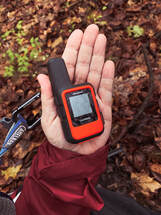 Safety on the trail is a hot topic currently and apparently it's mostly in regards to women. This is my surprised face. I belong to a bunch of hiking groups for Ohio on FB, and in the last few weeks several women have asked a) if as a woman, they will be safe if they hike alone and b) what folks use to stay safe while on the trail. I was shocked at the majority of responses (over 80) that said gun & a CCW...and not one person, besides me, said a GPS satellite communicator amidst the spackling of other suggestions (pepper spray, don't hike alone, tell someone...basically another blog post at some point). Fuck that noise, noting that I have nothing against guns (I'm too clumsy to carry, not to mention I'm guessing someone would wait till they were right next to me to attack me and getting the gun pulled at that point would be quite difficult). However, this isn't to debate guns on the trails, but one particular way that can help you stay safe - GPS Communicators. Because, in reality, you're much more likely to fall, become seriously ill, etc. on the trail than you are to be attacked by a person. In fact, one of my biggest sources of anxiety was getting in to an area, having an issue like a seriously fall or coming across someone in need of help, and not being able to contact anyone. It freaked my family out, too. With the Garmin InReach, that's not an issue anymore - and I can see it's practicality, not just in hiking, but all sorts of situations - like a car accident in a rural area without service (check out my previous article on all the benefits of a GPS Communicator here). So what's awesome about it? Well, it's small - 3.9 x 2 x 1 inches and weights only 3.5 ounces. Weight reallllly matters to me with my back injury, and was one of the main reasons I hadn't picked one up previously. What I Love - pls bear in mind I have the cheapest subscription option...:
Downsides:
I've used the Garmin InReach Mini on quite a few trips now, and EVERY. SINGLE. MESSAGE I've sent has made it through, even when in valleys, in the snow, and it's overcast with tree cover. At some point, I'll go over one that I tried before the Garmin that wasn't quite as...successful, as well as how to stay safe against predators - both human and animal. Do you use a GPS Satellite Communicator? Why or why not? Do you like it? Leave a comment below or contact me here! The video at the top of this post is how I envision night hiking - always ready to FLEE. As the days begin to cool and the temperatures drop, the sun dips out of sight faster and faster. And it's *F83king* scary. I normally hike alone, which as a misfit hiker, already puts me on high alert thanks to the unique hazards that poses. This post is specifically about night hiking for beginners......who hit those dark and dusty trails all alllooooonnnne. If you have an active imagination like I do, you literally think the worst the whole time. Aliens. Monsters. There are two reoccurring images that constantly pop in to my head as I'm hiking in the complete blackness of the forest. First, that I'll turn around and there will be someone just standing on the trail, legs slightly apart and head cocked, and they'll be staring at me. Not moving. Just standing. The second image is that someone will come running full sprint through the woods at me, like in "Get Out." The third is it will be like the Blair Witch and I'll stumble upon a cabin in the middle of the woods. The fourth is I'll be walking, and just keep walking. And walking. And walking. And the trail won't go anywhere. Okay, so maybe more than 2....  The Gamork The Gamork The dark has always been an awful and terrifying thing for me, every since my father terrorized my fragile five-year-old mind by stalling the car out on a wood-lined dirt road and yelling about how the Gamork (the monster in the Neverending Story was about to get us. He'd then "manage" to get the car started and would careen down the road to our house. You know, tender moments of parental bonding that last a lifetime. But as the sun fades quicker, I don't want to find myself limited to hiking on the weekends. I want to still be able to go after work. So what do I do to prepare myself mentally and so I'm physically safe when I'm out hiking alone?  1. Headlamp: I bring a lightweight headlamp with me, and I make sure I have extra batteries. I use the Black Diamond Spot Lite 160, from REI, which was a cheap $26.00 bucks and has done me well. 2. Know Thy Trail: I wouldn't recommend doing an unfamiliar area in complete darkness. Does it take some of the scary fun out of it? Yes, but losing your footing on some loose shale and snapping your neck falling down a cliff will ALSO put a damper on the fun. 3. Choose Carefully: The trails I head out on at night are ones that are moderately difficult, but not crazily technical. As a night-hiker beginner, I only do trails at night if I've hiked them a number of times in the light, after reading reviews and having an idea of the general safety of the area. I also familiarize myself with the wildlife, so I know what's going to be scuttling around me. Why take chances? 4. Cell Phone: I carry a fully charged cellphone with me so I can call for help if I need to, and it gives me a backup light. If you're going in to really remote areas, get a personal GPS - to figure out the right one for you, check out this article from REI. 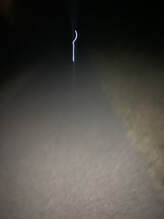 No idea wtf this random light was and I try not to think about it. No idea wtf this random light was and I try not to think about it. 5. Implements of Safety: get a small canister of pepper spray. I won't link what I have, because it doesn't have a keychain/way to connect it, and I wish it did. Make sure you can attach it somewhere, because the one instance I really needed it I couldn't get it out of my pocket in time. Pepper spray will help defend against coyotes, dogs, wayward hilljacks, etc. I carry 2 to 4 oz. I also carry a small knife. Though the rule of thumb is if someone/something (i.e. Pennywise) can get that close to you, you're probably &^%$$ anyway. 6. Hike Buddy: Make sure someone knows where you're going, when you start, and when you plan to be done. Every. Single. Time. If nothing else, they talk you down when you see crazy *&^% on the trail at night (see image on right) 7. Hiking Poles: I always use hiking poles, especially in the dark. Helps me keep my footing, and has saved me from tripping and falling a number of times. *Always take your regular gear, too, like water and a map. 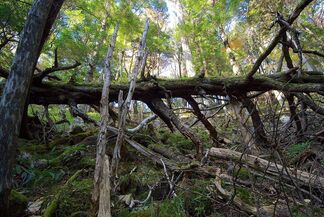 Once I'm on the trail, I check behind me at regular intervals (about every 50 feet). I don't wear ear buds for my book on tape, for two reasons: so night runners, etc. will know there's someone else around and so I can listen more acutely. I also keep an eye out upward for any potential deadfall (branches or trees about to come down on my head). You want to be extra careful during hunting season, that some yahoo poaching deer doesn't mistake you or your dog for the big kill of the season. Be sure to check local park pages to see what's in season and when. At night, consider reflective gear, too. Some folks like to turn off their headlamps and hike in complete darkness. That isn't me. Besides my imagination, it's a safety issue for me, as I hike in areas with a lot of rocks and tree roots. And monsters that I want to be able to see coming. If you're like me, and your imagination can carry you in scary, unhelpful directions, have a phrase you can repeat to redirect your attention. I like a line from Stephen King's "The Stand" - He thrusts his fists against the post and still insist he sees the ghost. And finally, have fun! Night hiking isn't for everyone, but if you're willing to try it, it is a TOTALLY different experience. I'll be sure let you know if it gets any less scary! Do you hike at night? Have a good story of terror in the darkness of the trail? Have any additional tips for hiking at night or have a question? Post away or contact me here! |
Archives
March 2021
Categories
All
|
